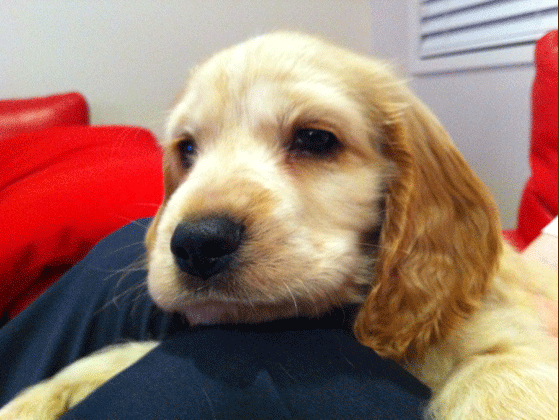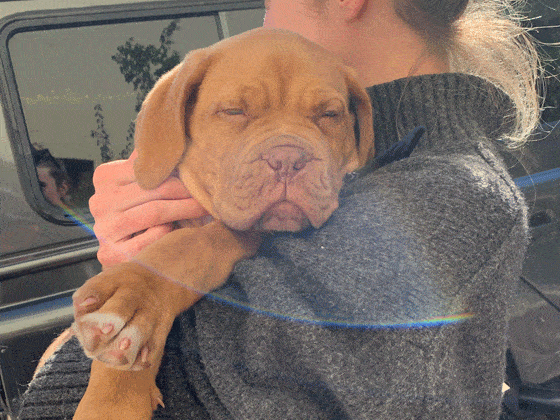There’s one very big problem with getting a puppy to sleep, and that’s a change in their everyday routine that comes at exactly the wrong time.
By the way .. any links on this page that lead to products on Amazon are affiliate links and I earn a commission if you make a purchase. We only suggest products that we believe benefit our community of dog owners.
You’ve probably been given the same 3 pieces of advice over and over again
- ‘take your dog for a walk to make sure he’s tired’
- ‘let him go to the toilet so he won’t need to go in the night’
- ‘give him a shirt that smells like you to keep him comfortable’
While this is all good advice to follow, when it just doesn’t seem to be working, you feel you must be missing something and try to figure it out. Easier said than done when you’re sleep deprived.
What you’re not told about sleep habits of puppies
From around 8 weeks of age a puppy will begin to notice differences between night and day, and may naturally start to settle in the dark as its owners and littermates do.
By 12 weeks of age the pup may be starting to sleep mainly at night. This is also the time that many pups are moved from their litters into a new home with a new owner. Their routine is disturbed and that is essentially undoing the natural progression from recognizing the quiet time to sleeping during this period.
Sleep training isn’t impossible though. These are 2 valuable pieces of advice that often go overlooked when it comes to sleep training dogs.
1. The importance of DHA in a puppy’s diet
What you feed your puppy (or, more importantly, what you don’t feed him) can have a huge impact on your dog’s sleeping habits, and on his ability to be sleep trained effectively.
Studies have found that dogs are much more responsive to the concept of training if they’re fed a diet that’s high in Docosahexaenoic Acid.
DHA is a type of Omega-3 fatty acid that’s vital for the growth and development of a dog’s brain, vision and central nervous system.
DHA is naturally found in a mother’s milk, which is why puppies who have recently moved into a new home may be lacking in the fatty acid. Fortunately, it’s easy to increase the amount of DHA in your dog’s diet. It’s often found in many types of dry dog food and is also in large quantities in organ meats and offal.
68% of puppies,* on average, are likely to complete a training task successfully if they’re fed a high DHA diet, compared to just 30% of dogs fed a diet that’s lacking in DHA. That’s an eye-opening statistic.
Purina Pro Plan focus puppy dry food and Optimum Puppy wet dog food have added DHA in their formulas.
When thinking about how to get a puppy to sleep, however, it’s not just what you feed, it’s when you feed him.
How long before sleep should a puppy be fed?
Puppies should be fed their dinner approximately 3 hours before bedtime. This gives them enough time to digest their food so they won’t be uncomfortable as they try to sleep. It also gives dogs plenty of time to toilet, so be sure to take your dog for a short walk before bed to enable him to go to the toilet.
2. Give your puppy some personal space
Where’s the best place for a puppy to sleep?
Many dog owners love having their animals sleep on or near their bed. One piece of advice that’s often given to new dog owners is to place the dog’s bed near to your own bed. The reason is so the dog won’t feel lonely and can be close to you. This does work for some people. But it’s not the best option for everyone, especially if you intend successfully sleep training your puppy.
Why is it not ideal? Because we disturb our dogs.
Studies show that more than half of all dog owners accidentally disturb their dogs during the night * without even knowing. It could be from snoring, sleep talking, or from trips to the bathroom.
A dog’s sleep/wake cycle
This tends to happen because dogs have very short sleep/wake cycles – approximately 3 episodes per hour during the night.
The sleep/wake cycle is normal. It’s a period of sleep followed by a short period of wakefulness. Humans also have sleep/wake cycles, but ours are much longer, and much less pronounced. Some dogs are quite alert during the ‘wake’ part of the cycle and might bark, while others remain drowsy and quiet. If your dog is disturbed during a period of wakefulness, he’ll certainly let you know about it!
Consider placing a dog bed in another part of the house, or using a kennel.
Dogs like to feel cosy and secure. A small, comfy space that he can climb into works well.
The good news is the sleepless nights will get better.
With a little care and attention, (and patience), it’s not too challenging to teach a puppy to sleep.
Once fully trained, studies have shown that dogs will sleep primarily between the hours of 9pm and 4am* when the sky is at its darkest, allowing you some much-needed rest.
When you understand what’s happening, it’s easier to stay positive and patient. There’s more to sleep training a puppy than most owners realize. Sleepless nights are no fun for anyone.
Don’t worry; your puppy will sleep through the night – it WILL happen! And then as he grows, the next step is to focus on getting your dog to sleep later in the morning.
You might also like
 Dog Pooper Scooper with Long Handle
Dog Pooper Scooper with Long Handle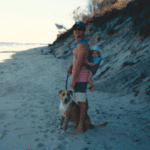 How to Safely Exercise an Arthritic Dog
How to Safely Exercise an Arthritic Dog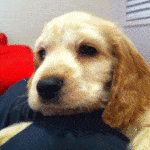 Why Choose Us for Pet Bedding?
Why Choose Us for Pet Bedding? Washable Dog Blankets
Washable Dog Blankets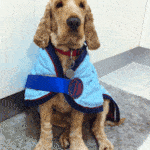 How to Help a Dog with Arthritis
How to Help a Dog with Arthritis Best Compostable Dog Poo Bags
Best Compostable Dog Poo Bags How to Get Your Dog to Sleep Later in the Morning
How to Get Your Dog to Sleep Later in the Morning How to Clean Dog Bedding
How to Clean Dog Bedding Pooper Scooper with a Long Handle – All in One
Pooper Scooper with a Long Handle – All in One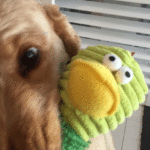 How to Stop Dogs Chewing their Bed / Destructive Chewing
How to Stop Dogs Chewing their Bed / Destructive Chewing


